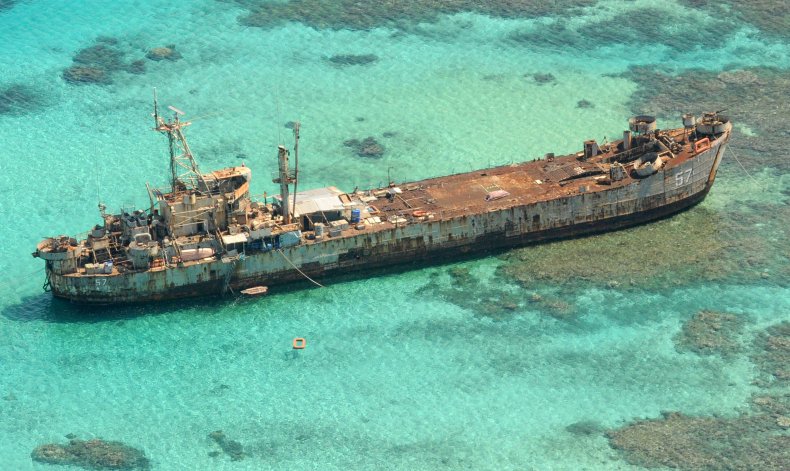Chinese vessels have backed down from a Philippine-occupied atoll in the South China Sea after imposing a quasi-blockade that provoked strong warnings from Manila and Washington.
Philippine Defense Secretary Delfin Lorenzana told reporters on Sunday that "the Chinese will not interfere per my conversation with the Chinese ambassador." He was referring to Beijing's envoy in Manila, Huang Xilian, who received a formal diplomatic protest from the Philippine government last week.
Lorenzana said he and Huang had been in communication since November 16, when three white hull China Coast Guard ships prevented two wooden supply boats from delivering food and other provisions to Philippine troops stationed on Second Thomas Shoal—part of the disputed Spratly Islands archipelago. Philippine leaders said China's ships used water cannons in the clash.
The defense chief said the boats would return at an unspecified time this week, without additional naval or coast guard escorts. "We will see if they are true to their word as our Navy will proceed with the resupply this week," Lorenzana said, according to a report by the Philippine Daily Inquirer on Monday.
A small contingent of the Philippine Marine Corps has occupied the atoll, known in the Philippines as Ayungin Shoal, since its navy deliberately grounded World War II landing vessel BRP Sierra Madre to serve as an outpost in 1999. The island is about 105 nautical miles off Palawan in the West Philippine Sea—Manila's term for the eastern portion of the South China Sea that falls within the Philippine exclusive economic zone (EEZ).

Last Thursday, two days after the water cannon incident, Philippine Foreign Secretary Teodoro Locsin Jr. released a statement accusing one of the Chinese government vessels of firing a water cannon at the Philippine boats, forcing them to abort their resupply mission. The official warned Beijing by invoking the Philippines-United States Mutual Defense Treaty, under which Washington has pledged to defend Philippine vessels from attacks in the contested South China Sea.
Philippines was backed on Friday by the U.S. State Department, which released a statement calling the Chinese actions an "escalation that directly threatens regional peace and stability, escalates regional tensions, infringes upon freedom of navigation in the South China Sea."
The Biden administration also reaffirmed its defense treaty commitments in the apparently effective statement of solidarity with Manila.
"They have no right to impede, prevent or harass our ships within our EEZ [exclusive economic zone]," the Inquirer quoted Lorenzana as saying, "whether we are fishing or bringing supplies to our detachment in the Sierra Madre in Ayungin Shoal," he said.
Philippines said China had reduced its coast guard presence and also removed its "maritime militia"—a paramilitary-like armed fishing fleet—which China denies operating.
Queried about the latest South China Sea standoff, Chinese Foreign Ministry spokesperson Zhao Lijian said on Monday that Beijing and Manila were in "close communication."
"China's territorial sovereignty and maritime rights and interests in the South China Sea are supported by a solid historical and jurisprudential basis," said Zhao. "All attempts at challenging China's sovereignty and interests are doomed to fail."
China's government asserts sovereignty over nearly the entirety of the energy-rich South China Sea via historical claims to every single island, atoll, reef and rock inside its so-called "nine-dash line."
After Chinese vessels blockaded Philippine boats and seized control of Scarborough Shoal in 2012—with the U.S. choosing not to intervene—Manila took Beijing to the Permanent Court of Arbitration in The Hague in the case known as Philippines v. China.
The three-year legal proceedings yielded a win for the Philippines, with arbitrators determining that China's claims had no legal basis under the United Nations Convention on the Law of the Sea. China rejected the ruling in full.
